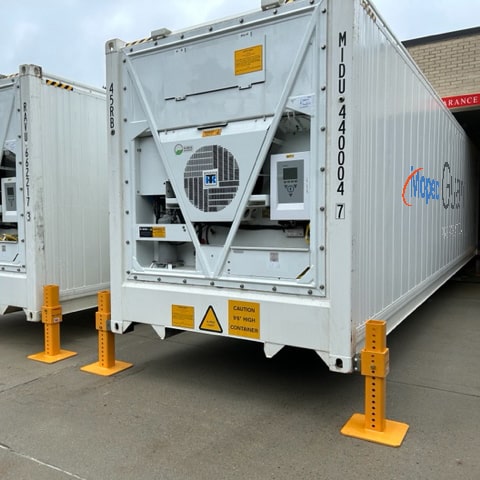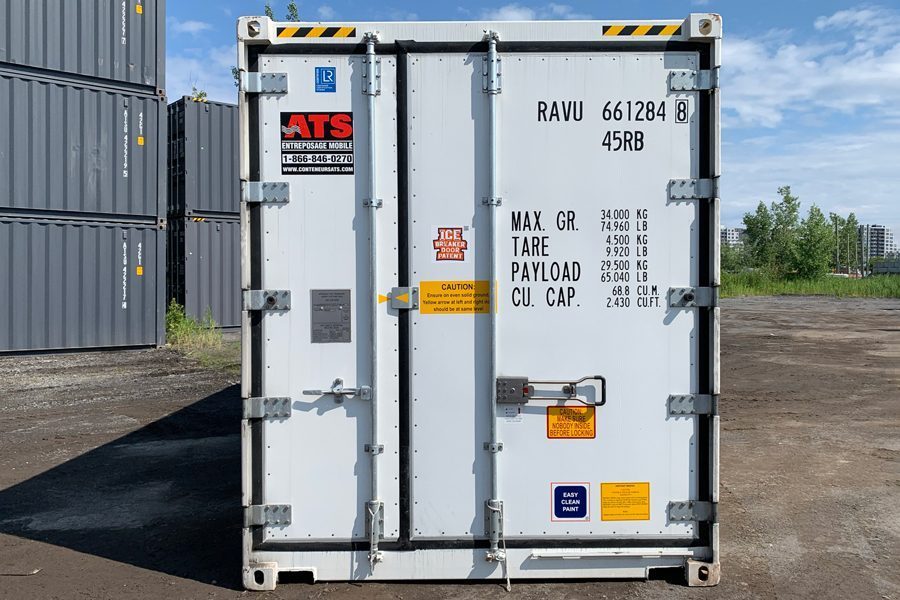Everything About Cold Storage Space Containers: Vital Insights for Your Storage Demands
Freezer containers play a vital duty in the conservation of subject to spoiling goods. They can be found in different forms, consisting of chilled and insulated devices, each designed for specific storage needs. Comprehending the advantages and key attributes of these containers is crucial for businesses intending to enhance their procedures. As the need for reliable storage remedies grows, discovering the different alternatives offered can lead to informed decisions that influence both success and sustainability. What factors should one take into consideration when choosing the best container?
Kinds Of Cold Store Containers
Cold store containers been available in different kinds, each designed to meet specific temperature control demands. Among the most common kinds are cooled containers, which preserve temperatures between 0 ° C to 10 ° C, making them ideal for disposable products like fruits, veggies, and dairy products. An additional type is the deep freezer container, which runs at temperatures listed below -18 ° C, ideal for lasting storage of frozen products such as meats and fish and shellfish.
Shielded containers provide temperature stability without energetic air conditioning, making them helpful for short-term transport of temperature-sensitive products. In addition, there are portable freezer units, which use adaptability in places and are frequently utilized in occasions or seasonal procedures. Finally, blast chillers rapidly reduce the temperature of warm foods, making certain safety and security and top quality. Each type offers a special objective in different sectors, from food solution to pharmaceuticals, emphasizing the value of picking the ideal container for certain storage requirements.

Advantages of Making Use Of Cold Store Solutions

Cold storage options prolong the shelf life of items, decreasing waste and increasing success for companies. By successfully managing supply with correct temperature level control, companies can maximize their supply chains and enhance operational performance.
In addition, cold store facilities permit flexible storage space options, suiting different quantity demands and seasonal variations sought after (used 40ft refrigerated shipping containers). This adaptability helps organizations respond rapidly to market adjustments
Finally, utilizing cold store solutions can guarantee compliance with health and wellness and safety regulations, safeguarding both consumers and companies. Generally, the tactical use chilly storage space enhances product administration while advertising sustainability and economic viability.
Trick Attributes to Search For in Cold Storage Space Containers
When picking freezer containers, a number of essential features quality careful consideration to protect peak performance and dependability. Temperature control capacities are important; containers need to preserve consistent temperature levels appropriate for details goods. Insulation quality additionally plays a significant duty, as exceptional insulation decreases power intake and boosts temperature level stability.
Next off, convenience of gain access to and loading is vital; containers must provide user-friendly layouts for effective handling and organization. Sturdiness is an additional vital facet; weather-resistant materials guarantee long life and protect contents versus ecological elements.
In addition, flexibility functions, such as integrated wheels or raising points, promote transport, while customizable designs permit customized storage solutions.
Finally, keeping track of systems, including temperature alarm systems and remote tracking, supply real-time updates, making sure that conditions remain excellent. By concentrating on these features, individuals can pick cold store containers that fulfill their operational demands properly.
Selecting the Right Freezer Container for Your Requirements
Picking the right chilly storage space container requires a thoughtful evaluation of functional requirements and certain needs. Aspects such as the kind of products being saved, temperature level of sensitivity, and quantity should be prioritized. For circumstances, perishable food items may require containers with rigid temperature level controls, while drugs may need specific conditions to maintain efficacy.
Additionally, possible customers need to consider the container's size and movement. A larger system may be required for bulk storage, while smaller, portable options can be perfect for short-term or on-site requirements. Insulation high quality and energy efficiency are also critical, as these will influence functional prices and temperature level stability.
Conformity with market guidelines and requirements is crucial, particularly in fields like food and health care. By very carefully examining these elements, customers can pick a cold store container that properly fulfills their distinct demands and guarantees optimal storage problems.
Best Practices for Preserving Cold Store Issues
Preserving suitable cold store conditions is important for maintaining the quality and safety and security of temperature-sensitive products. On a regular basis checking temperature and moisture levels is essential; utilizing reliable electronic thermostats and hygrometers can give exact analyses. Furthermore, proper insulation of freezer containers aids minimize temperature variations and energy loss.
Applying a first-in, first-out (FIFO) system guarantees that older supply is utilized prior to more recent supply, decreasing waste (used 40ft refrigerated shipping containers). Additionally, preserving an arranged layout within the storage space permits much better airflow and lessens the danger of cross-contamination
Regular upkeep checks on devices, such as seals and compressors, are very important to avoid breakdowns. Staff training on finest techniques for filling and unloading products helps preserve temperature level integrity. Keeping doors closed as much as possible limits warmth exchange, assuring that the cool storage setting continues to be effective and steady in protecting valuable items.
Price Factors To Consider for Cold Store Solutions
When reviewing chilly storage services, it is vital to consider the preliminary investment costs along with recurring operational costs. A detailed breakdown of these expenses can disclose considerable long-term financial savings possibility for businesses. Comprehending these financial elements aids stakeholders make educated choices regarding their freezer needs.

Initial Financial Investment Prices
The economic landscape of chilly storage space containers presents different initial financial investment expenses that businesses should take into consideration. These costs normally consist of the purchase or rental price of the containers, which can vary based upon insulation, kind, and dimension quality. In addition, expenses related to retrofitting existing structures to fit freezer has to be factored in, especially if specialized equipment is called for. Setup expenses, consisting of electric work and refrigeration systems, additionally add to the overall first financial investment. Businesses should not overlook transport expenses for delivering containers to their wanted place. Prospective personalization choices, such as shelving or temperature monitoring systems, can further influence the preliminary financial outlay. Mindful budgeting for these elements is important for effective cold store implementation.
Functional Costs Breakdown
Operational expenditures for chilly storage options encompass several critical expense factors to consider that services should browse. Key aspects consist of energy expenses, which can be significant due to the requirement to keep low temperature levels. Upkeep expenses are likewise substantial, as regular servicing is necessary to ensure devices operates effectively and stays certified with health and wellness criteria. Furthermore, labor prices may develop from the requirement for specialized personnel to handle and monitor the storage setting. Insurance expenditures are one more consideration, as companies need to secure their financial investments against possible losses. Any type of possible governing conformity expenses need to be factored in, as organizations might need to invest in systems that stick to food safety and security and environmental laws. Understanding these expenses is crucial for effective budgeting.
Long-Term Savings Potential
Purchasing freezer services provides substantial lasting financial savings capacity, transforming preliminary expenses into monetary performance over time. By reducing wasting and waste, companies can boost their profit margins significantly. Advanced insulation and energy-efficient systems lower utility expenses, which collect over the lifespan of the devices. Furthermore, freezer containers frequently call for much less frequent upkeep compared to typical refrigeration techniques, bring about reduced repair expenditures. The capability to shop products for extensive periods without endangering quality permits businesses to exploit on market changes, maximizing revenue. Furthermore, the scalability of cold store services enables business to adjust to changing demands without sustaining excessive expenses. In general, these variables add to a compelling instance for cold store as an affordable investment technique.
Often Asked Questions
For How Long Can Food Be Kept in Cold Store Containers?
The duration food can be kept in cold store containers differs by kind. Typically, disposable things last from days to weeks, while icy foods can remain risk-free for months, relying on correct temperature and storage conditions.
Are Cold Storage Containers Energy-saving?
The power efficiency of cold store containers differs based upon design and insulation high quality. Modern devices commonly utilize sophisticated technology to minimize energy intake, ultimately adding to minimized functional costs and ecological effect in long-lasting usage.
Can Cold Storage Space Containers Be Personalized for Certain Requirements?
Cold storage containers can certainly be customized to fulfill details needs. Modifications might include temperature level controls, size modifications, and extra attributes, allowing customers to tailor options effectively for various storage space demands and operational preferences.
What Are the Usual Dimensions of Freezer Containers?
Freezer containers generally come in basic dimensions such as 10, 20, and 40 feet. These measurements accommodate different storage website needs, ensuring adaptability for companies needing temperature-controlled settings for subject to spoiling items or sensitive materials.
Do Cold Store Containers Require Special Permits for Usage?
Cold store containers typically require special authorizations for use, relying on regional regulations and meant applications. Authorities might mandate permits to assure safety criteria, environmental conformity, and proper functional practices are preserved during their application.
Cold storage containers come in numerous types, each created to meet certain temperature control requirements. In addition, cold storage space facilities permit for flexible storage space alternatives, accommodating different quantity needs and seasonal variations in demand. Selecting the appropriate cold storage container needs a thoughtful assessment of operational needs and particular demands. The economic landscape of cold storage containers provides numerous first investment costs that businesses need to consider. Cold storage space containers can undoubtedly be personalized to fulfill specific needs.